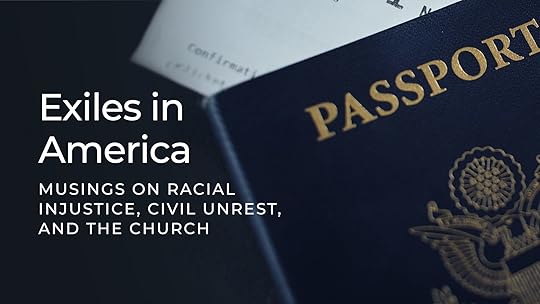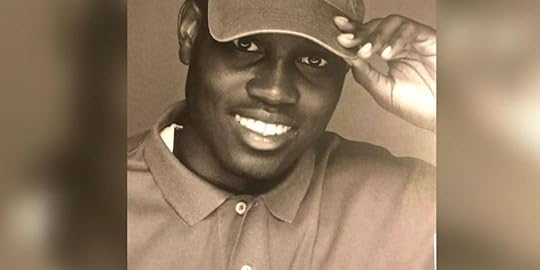Steve Murrell's Blog, page 36
July 9, 2020
...
REPUTATION VS. REALITY. In today’s message, we’re going to talk about the importance of church community.
July 2, 2020
Great is Thy Faithfulness
GREAT IS THY FAITHFULNESS. Today, I want to look at Lamentations 3:22–24 with you. As we go deep into this text, I hope that we will gain a new vision for the rest of this year and beyond. Above all, I hope that we will begin to see things as God wants us to see them.
June 18, 2020
The Prodigal Son and the Heart of the Father
THE PRODIGAL SON AND THE HEART OF THE FATHER. I want to talk briefly about parenting and teaching our kids how to honor. Ultimately, the way we teach them to honor their mother and father will significantly affect how they honor God.
June 12, 2020
...
RACIAL RECONCILIATION AND THE CHURCH. Racial reconciliation is a gospel issue that demands a gospel response. Let’s talk about how to know what cultural issues demand a response from Christian leaders and what that response should look like.
June 4, 2020
Exiles in America: Musings on Racial Injustice, Civil Unrest, and the Church

I was born and raised in Jackson, Mississippi, where I attended an all-white private prep school, played golf at a white country club, and was confirmed at an all-white Episcopal church. My sophomore year at Mississippi State University was the first time in my life to have a black friend. His name was Jerome, and I met him at a campus ministry event.
In 1984, when I was twenty-five, I moved to Manila, Philippines, in the midst of historic civil unrest. It was one year after the assassination of Ninoy Aquino, and the city streets were flooded with young people protesting the oppressive regime. Riot police, water cannons, and tear gas were a daily reality not only for the protesters but for our church ministry team who preached the gospel on the streets.
What I learned through my friendship with Jerome was how to see America differently—his experience was not as just, free, or equal as mine. And what I learned living in the Philippines was how to see myself differently—as a foreigner, a citizen of a different country.
Though I am writing about an American situation, every Christian in every nation will have to come to grips with these two realities: your national story is fatally flawed, and your true citizenship is in heaven. If we fail to see the brokenness and injustice of our own nation, we cannot become agents of justice and reconciliation. But if we fail to understand that we are actually citizens of heaven, we will continually confuse earthly kingdoms with the Kingdom of Heaven and become disillusioned when perfect justice and peace elude us.
I’ve been reminded of these two realities as I have watched the news unfold over the last few days. The violent, senseless, and unjust killing of George Floyd at the hands of a white police officer in Minneapolis has served as another painful reminder of the sin of racism in America. And the subsequent civil unrest—fueled by decades of disappointment and disillusionment with the American dream—has reminded me that America is more like Babylon than the new Jerusalem.
I understand that this claim may be offensive to both black and white Christians for different reasons.
My white brothers and sisters, who tend to see America as the Promised Land (a place of freedom and prosperity), may take exception to the unflattering comparison of America with Babylon. While there is much to be grateful for in American history, there is also much to grieve. The reality is that America, no matter how just and democratic, will always be closer to Babylon than the new Jerusalem.
My black brothers and sisters, who might tend to see America as Egypt (a place of bondage and oppression), may take exception to the comparison of America to Babylon because Israel’s freedom from Babylonian captivity was much less decisive and complete than the Exodus. People may see this as a tacit argument for being satisfied with the status quo. But the Israelites were never called to be satisfied with their captivity (see Psalm 137); they were called to seek the peace of the city (Babylon) while continuing to long for their true homeland (Jerusalem).
When I think about my multiple decades in the Philippines, I have lived through four democratic transfers of presidential power, two (bloodless) revolutions (1986 and 2001), and one impeachment. As a longtime resident of the Philippines, I have been affected by the political ups and downs of the nation. I have rejoiced in the Philippines’ successes and grieved at its injustices and failures. But I have done so as a foreigner. My joy and my sadness in the Philippine story is not rooted in nationalism but rather in my love for the Filipino people and my commitment to the call of God.
This, I would argue, is how every American Christian should relate to the ups and downs of the American experiment. We should seek the peace of the city and nation—not because our ultimate destiny is wrapped up in the American story but because God in his providence has put us here and called us to love our neighbor. When we adopt this exilic mindset, we will be able to seek justice and peace for the right reasons and with the right perspective.
But we can’t do it alone.
I, as a white man raised in the South, could not see the inequity and injustice all around me until I met Jerome. And I don’t think that Jerome, who had experienced inequity and injustice growing up in segregated Mississippi, could have truly been reconciled until he found himself in a campus ministry with white people who loved him like a brother.
In turbulent times like these, it can be easy for Christians (both black and white) to give up on multiethnic church community. Relationships are always easier when we pursue them with people who look and think like us—fewer misunderstandings, fewer awkward social media posts (or non-posts), fewer offenses to work through.
But God has called us be a peculiar people—a people of every nation, tribe, and tongue. A community of the redeemed who are committed to the ministry of reconciliation and called to be ambassadors of a different kingdom.
While we live here as exiles, let us not lose heart and let us pray and live these words of our king and redeemer Jesus: your kingdom come, your will be done on earth as is it in heaven.
May 21, 2020
Flourishing as a Leader
FLOURISHING AS A LEADER. The Bible’s description of flourishing looks a lot different than the world’s standard. Today, I want to talk about the three things leaders can do—in any season—to flourish.
May 9, 2020
Ahmaud Arbery and John Murrell: Personal Reflections on Injustice, History, and Hope

As has been the case with many current events, my son, William, and I recently had a conversation about the tragic murder of Ahmaud Arbery. I’ve asked him to share his thoughts in light of a surprisingly relevant piece of Murrell family history.
William S. Murrell, Jr.—Amidst the flood of COVID-19 news, another tragic story has surfaced—one that reminds Americans that even during a global public health and economic crisis, the national scourge of racism is still with us.
For those unfamiliar with the tragic death of Ahmaud Arbery (who was shot while jogging near his home), I recommend reading this article or this article for a detailed analysis of the facts as we know them today.
As I’ve grappled with how to respond (privately and publicly) to yet another needless killing of an unarmed black man, I’ve found strange solace from the biography of a distant ancestor of mine named John Murrell—who became (in)famous in the 1820s and 30s as a bandit, horse thief, and slave-stealer in the southern United States.
As a slave-stealer, Murrell would help African American slaves escape from their masters and would pretend to be a “conductor” on the Underground Railroad. However, the journey north to freedom had a twist: Murrell (with the cooperation of the recently freed slave) would resell the slave to a new master and then help them escape a few days later. Murrell would do this several times on the journey north with the promise that when they reached freedom, he would split the profits with the newly freed slave so that he or she would have money to start their new life. But Murrell never came through. Either he would abandon the slave with their new master if things got too complicated; or worse, he would kill the nameless “negro” once they got close to the border.
Reading and reflecting on Murrell’s biography has helped me process Ahmaud Arbery’s death (and American racism in general) in at least four ways.
First, Murrell’s biography has provided me with a horrifying yet salutary reminder of human depravity and sin. Since my last name is not very common, it has been surreal to see the name “Murrell” referred to so frequently as the agent of such violence and evil (murder, robbery, slavery, rape, etc). While reading the accounts of Murrell’s breathtakingly depraved deeds—particularly towards black people—I find myself subconsciously trying to disassociate from my ancestor and his sins. But every time I make this mental move, I sense the Holy Spirit reminding me that his blood runs in my veins. Apart from God’s grace, I am no more righteous than John Murrell and just as capable of unspeakable evil. Thus, I have begun reading Murrell’s biography as a picture of who I could have been had I lived in Tennessee in 1820 and not been redeemed by Jesus. To make matters even more personal, one of John Murrell’s main accomplices was his older brother, William S. Murrell. (To clarify, this is just coincidence; I was not named after him, nor was my father. But the coincidental name match was surreal nonetheless.)
Second, Murrell’s biography reminds me that sadly, Christianity can become a cover for racism and injustice. It turns out that besides being a bandit and a slave-stealer, John Murrell also had another life as an imposter Methodist circuit rider. On one day, we find Murrell preaching at a camp meeting (or outdoor revival) in Kentucky. On the next, we find him stealing the revival participants’ horses and slaves and heading to the next town. For Murrell, the persona of the Methodist preacher was the perfect cover for his other work. It gave him credibility with local communities as he traveled around the South. Though Murrell’s duplicity may have been more blatant than most, for generations, white Americans have hidden their racism behind a veneer of religion. For too long, Christians have dressed up their racism with theological arguments and the general perception of being respectable “God-fearing” citizens—which is how some defenders are characterizing Ahmaud Arbery’s killers.
Third, Murrell’s biography provides me with historical perspective on how easily and frequently our societies (whether in the nineteenth or twenty-first century) devalue human life. When Murrell was finally brought to justice in 1834, it was not for murdering African-American slaves but for stealing “property” from white slave owners. Throughout his biography, written shortly after his death, it’s amazing how inconsequential Murrell’s black victims appear in the eyes of the white storyteller. While the murders of black men and women are never condoned or celebrated by Murrell’s nineteenth-century biographer, his black victims are also never mourned—even named. I imagine that this historic devaluing of black lives (and deaths) is why events like the killing of Ahmaud Arbery can be so traumatic for African Americans today. It reminds them that their lives (in the eyes of some) continue to be undervalued nearly two centuries after emancipation. Remember, Arbery was killed on February 23, 2020, and no one was arrested or investigated, even though the police on scene knew who pulled the trigger. It was only after a video of the killing surfaced in early May that arrests and investigations were renewed.
Finally, Murrell’s biography offers me hope for justice in our day. I was fascinated to discover that Murrell’s capture in 1834 came at the hands of Tom Brannon, a black slave from Florence, Alabama, who outsmarted Murrell at his own game. Murrell had kidnapped Brannon and tried to enlist him in his grand scheme to start a slave revolt in the south. However, Brannon double-crossed Murrell and delivered him to the authorities, who rewarded the former slave with the $100 bounty (a lot of money in 1834) for aiding in the capture of the most-wanted man in America. At our present moment when justice so often seems to elude the black community, the story of Tom Brannon gives me hope that justice will be served in the case of Ahmaud Arbery.
Not only does Murrell’s biography give me hope for justice for Ahmaud Arbery and his family, it also gives me hope for the redemption of his killers.
According to Murrell’s biography, during his ten years in prison, Murrell repented and experienced a genuine religious conversion. He was regularly visited by (real) Methodists ministers who preached the gospel to a broken man who had spent his entire adult life lying, stealing, and killing—all under the guise of being a Methodist preacher. When he was released from prison in 1844, he became a blacksmith (a trade he learned in prison), and literally spent the remaining months of his life (before dying of tuberculosis) turning swords into ploughshares. I strongly believe that Ahmaud Arbery’s killers must be brought to justice, but I am also praying for their redemption and reconciliation.
If God can redeem John Murrell, He can redeem anyone. And if God can bring both justice and redemption in 1844, He can do it in 2020.
May 5, 2020
Distance Discipleship: It’s Not New

NASHVILLE—During the COVID-19 crisis, there has been a lot of discussion about how to conduct Sunday worship (singing, sermons, tithes, and even sacraments) virtually in a time of mandatory social distancing.
There has been much less discussion on how to make disciples in a moment when gathering together (even in small groups) is not an option for many people. How can we continue to make disciples in the COVID-19 era? How can we engage the lost, establish foundations, equip believers, and empower disciple-makers from a distance?
As I’ve spoken with pastors and campus missionaries around the world, I’ve heard many exciting and innovative ways that churches have continued to make disciples in this unique moment. One thing that I continue to reiterate to pastors and leaders as they think about discipleship is that distance equipping (especially in moments of crisis) is not new.
One of the most famous instances of distancing equipping is recorded in Paul’s second letter to Timothy. Paul was writing from prison in Rome and knew that death was imminent. It’s obvious from the letter that Paul desperately wanted to see Timothy in person (see 2 Tim 1:4 & 4:21), but because of circumstances that were out of his control, Paul had to settle on equipping the young pastor in Ephesus through a letter.
Because of how things turned out, we often think that this was Paul’s plan all along. But I guarantee you that Paul would have much preferred to communicate these leadership and discipleship lessons in person. Paul may have even wondered if the message might be lost in the medium. But in hindsight, we can see three real benefits to distance equipping—even when done under less than ideal circumstances.
Distance equipping forces clarity.
Though Paul would have certainly preferred to equip Timothy in person, letters forced Paul to articulate with great clarity exactly what he wanted Timothy to know and do. Paul had probably told Timothy a lot of these things in person (“preach the word,” “fan into flame the gift of God,” “guard the good deposit”), but writing them down forced Paul to think about every word. It’s often the same for us. Though we prefer to equip disciples in person, having to do it at a distance will force us to be more thoughtful and clear in our communication.
Distance equipping results in transferability.
Because Paul had to equip Timothy through a letter (a physical document), we can read (and benefit) from what Paul wrote Timothy today. Keep in mind that Paul’s words of encouragement, which have probably cut each of us to the heart, were not written to us. However, in God’s sovereign plan, he knew that Paul’s distance equipping of Timothy in the first century would benefit believers for the next twenty centuries. Paul was aware of the transferability of distance equipping materials, as he often told elders in churches to pass along his pastoral letters to other churches (see Colossians 4:16). So as you work hard to do distance equipping well, keep in mind that the results may be transferable beyond your specific context.
Distance equipping produces longing for embodied relationship.
A lot of commentators have speculated that the move to virtual meetings will be a game-changer in business, education, and even church. They argue that the experience will be so good, no one will want to go back to embodied meetings. While being forced to do distance discipleship will teach us some new and useful modes of doing the “same old boring strokes,” it will not make embodied, incarnational discipleship obsolete. If done right, distance discipleship will increase our appreciation for live small-group gatherings and one-on-one discipleship over a cup of coffee. Paul says it this way in the opening lines of his letter: “I long to see you that I may be filled with joy” (2 Tim. 1:4). And in the closing lines, he writes, “Do your best to come to me soon” (2 Tim. 4:9). In other words, this distance equipping is necessary and valuable, but it’s not enough.
As we continue in this challenging but necessary journey of distance disciple-making, my prayer is that we all would see the unique, God-ordained opportunities of this moment and that we would be faithful to the call to make disciples and equip disciple-makers.
April 16, 2020
Leading an Online Worship Service
LEADING ONLINE WORSHIP SERVICES. Though they look and feel different, online services are still worship services. We must incorporate elements that will lead others into worship. As pastors and leaders, it is our job to call people out of the world and into a sacred place, whether they’re watching from home or sitting in a pew.
2020 Easter Sunday
2020 EASTER SUNDAY. In this message, I talk about Luke 24 and why we should be filled with joy even in the midst of COVID-19.
Steve Murrell's Blog
- Steve Murrell's profile
- 53 followers



